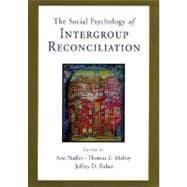
Note: Supplemental materials are not guaranteed with Rental or Used book purchases.
Purchase Benefits
What is included with this book?
| Introduction: Intergroup Reconciliation: Dimensions and Themes | p. 3 |
| Intergroup Reconciliation: Its Nature | |
| Reconciliation From a Social-Psychological Perspective | p. 15 |
| Socioemotional Reconciliation: Moving Beyond Victimhood, Guilt, and Humiliation | |
| Guilt, Victimhood, and Forgiveness | |
| Instrumental and Socioemotional Paths to Intergroup Reconciliation and the Needs-Based Model of Socioemotional Reconciliation | p. 37 |
| Transforming Trauma in the Aftermath of Gross Human Rights Abuses: Making Public Spaces Intimate Through the South African Truth and Reconciliation Commission | p. 57 |
| Social Categorization, Standards of Justice, and Collective Guilt | p. 77 |
| Prospects for Intergroup Reconciliation: Social-Psychological Predictors of Intergroup Forgiveness and Reparation in Northern Ireland and Chile | p. 97 |
| Restoring Respect and Esteem | |
| How Needs Can Motivate Intergroup Reconciliation in the Face of Intergroup Conflict | p. 117 |
| The Social Psychology of Respect: Implications for Delegitimization and Reconciliation | p. 145 |
| From Egosystem to Ecosystem in Intergroup Interactions: Implications for Intergroup Reconciliation | p. 171 |
| Instrumental Reconciliation: Contact, Common Identity, and Equality | |
| Contact and Common Identity | |
| Stepping Stones to Reconciliation in Northern Ireland: Intergroup Contact, Forgiveness, and Trust | p. 199 |
| Majority and Minority Perspectives in Intergroup Relations: The Role of Contact, Group Representations, Threat, and Trust in Intergroup Conflict and Reconciliation | p. 227 |
| A Social-Psychological Approach to Postconflict Reconciliation | p. 255 |
| Reconciliation, Trust, and Cooperation: Using Bottom-Up and Top-Down Strategies to Achieve Peace in the Israeli-Palestinian Conflict | p. 275 |
| Equality and Differential Power | |
| Diminishing Vertical Distance: Power and Social Status as Barriers to Intergroup Reconciliation | p. 301 |
| Social Identity, Legitimacy, and Intergroup Conflict: The Rocky Road to Reconciliation | p. 319 |
| Intergroup Relations and Reconciliation: Theoretical Analysis and Methodological Implications | p. 345 |
| Programs to Promote Intergroup Reconciliation | |
| The Road to Reconciliation | p. 369 |
| Promoting Reconciliation After Genocide and Mass Killing in Rwanda - And Other Postconflict Settings: Understanding the Roots of Violence, Healing, Shared History, and General Principles | p. 395 |
| Between Conflict and Reconciliation: Toward a Theory of Peaceful Coexistence | p. 423 |
| Help as a Vehicle to Reconciliation, With Particular Reference to Help for Extreme Health Needs | p. 447 |
| Intergroup Reconciliation: An Overall View | |
| Reconciliation After Destructive Intergroup Conflict | p. 471 |
| Index | p. 487 |
| Table of Contents provided by Blackwell. All Rights Reserved. |
The New copy of this book will include any supplemental materials advertised. Please check the title of the book to determine if it should include any access cards, study guides, lab manuals, CDs, etc.
The Used, Rental and eBook copies of this book are not guaranteed to include any supplemental materials. Typically, only the book itself is included. This is true even if the title states it includes any access cards, study guides, lab manuals, CDs, etc.